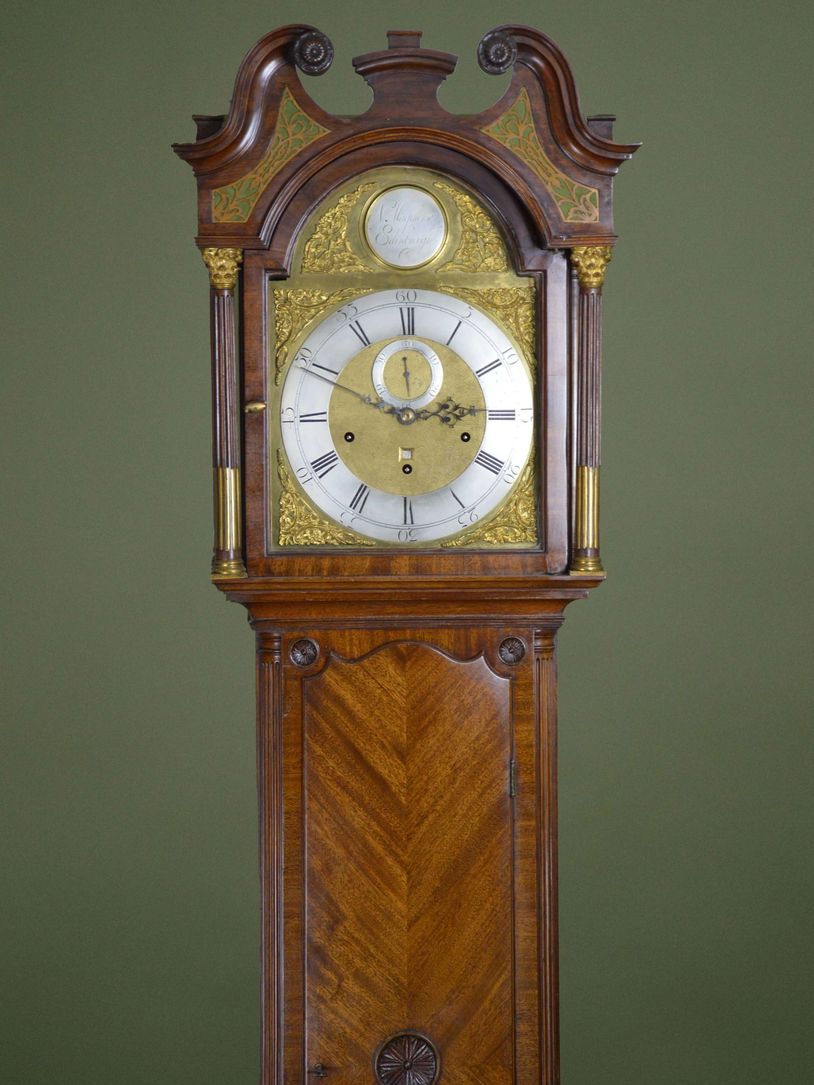Scottish longcase clock

Normand Macpherson, Edinburgh
£SOLD
A fine Scottish Longcase clock signed "N MacPherson - Edinburgh" with 1 month duration anchor mechanism striking the quarters upon a single bell and the hours on another. The brass dial is decorated with the usual gilded spandrels and silvered chapter ring with sub dials showing seconds and calendar. The 5 pillar mechanism is of extremely robust design and shows an artful execution to its construction.
The case is comprised of rich mahogany quartered veneer, not in the standard style of this period but there is another example of a musical clock by "MacPherson, London" which is housed in a case that is not what would be regarded as typical for this period. Month going Scottish clocks are somewhat a rarity, even more so in this condition. Further photographs are available on request.
MACPHERSON, NORMOND. Edinburgh, 1749-83.
" Son to William Macpherson, Excise Officer ; booked to Andrew Dickie 5th August 1749. Discharged of his indentures i/th November 1759. Presented a bill to be admitted freeman, and an essay and essay masters were appointed to him on 23rd July 1763.
" Compeared on 4th February 1764, and presented his essay, being a watch movement made in his own house, as Samuel Brown, Daniel Binny, and William Auld, his essay masters, declared, which was found a well wrought essay, etc., and the said Normond Macpherson was admitted a freeman clock and watch maker of this Incorporation." — E. H. Records.
" Macpherson, Watchmaker, Edinburgh, gives his most grateful acknowledgments to his friends and customers, and acquaints them that he has moved from the back of the City Guard to a well frequented shop at the upper or west end of the Luckenbooths, fronting the Lawnmarket, where he carries on the clock and watch making business in all its branches, and has at all times a good assortment of clocks and watches which he sells on the most reasonable terms, also repairs clocks and watches of all kinds. An apprentice wanted." — Caledonian Mercury, 8th September 1781.
" To be sold by public roup on Wednesday, the 3<Dth January, betwixt the hours of five and six afternoon, the dwelling-house and shop lying at the back of the City Guard as previously possessed by Mr Macpherson, watchmaker, at the yearly rent of £18 sterling." — Ibid., I2th January 1782.
" Macpherson, Clock and Watch Maker, formerly at the back of the City Guard, now in the Lawnmarket, near the head of Forrester's Wynd, has at present on hand a very valuable assortment of the following goods, all warranted, which he is determined to sell on the most moderate terms: — Gold and silver cap'd, jewelled, and horizontal watches ; gold and silver repeating watches ; gold, pinchbeck, and silver stop watches with seconds from the centre or from the cantrate axis ; gold and pinchbeck graved and chessed watches ; gold cap'd and jewelled or with plain movements ; gold and pinchbeck enamelled watches ; pinchbeck watches of all kinds with plain, graved, chessed, Nourse skin and tortoise-shell cases; the much approved of and fashionable large-sized silver watches, with seconds from the cantrate axis ; eight-day spring or table clocks for striking the hours and chiming the quarters; eight-day plain spring or table clocks, with a variety of eight-day long clocks and timepieces in mahogany or wainscot cases ; timepieces for chapels or gentlemen's kitchens, with large or small dials. Clocks and watches lent out by the month or year. Clocks wound up, regulated, and kept by the year at a moderate rate.
" N.B. — At said shop and no where else may be had equation tables, without which no gentleman or watchmaker can set clocks or watches with the sundial. Commissions from the country carefully attended to." — Ibid., 2nd January 1783.
To Normond Macpherson has been given the honour of having his name and pedigree duly recorded in Douglas's Baronage of Scotland. His father was the fourth son of William Macpherson of Nuid. In 1722 the eldest son of this latter, named Lauchlin, succeeded to the chieftainship and was ever afterwards designated by the title of Cluny. It thus followed that Normond was the nephew of this chieftain, and it is interesting to note that all Normond's brothers, five in number, were engaged in industrial or commercial pursuits, such as a hosier, merchant tailor, schoolmaster, another captain of a privateer, who, having made a handsome fortune, settled in Philadelphia, while the fifth was bred a writer and invented some new machine of great use in the dressing of flax and hemp. There can be no doubt that this aristocratic family connection was a considerable factor in Normond Macpherson's career. He died in 1783, after carrying on an extensive business for over twenty years, when it was continued by his son, who died two years later (see page 232). The business was next carried on under the title of Macpherson & Co., or Macpherson and Leslie. A characteristic example of Normond Macpherson's handiwork is now located in the board room of the British Linen Bank, St Andrew Square, Edinburgh (see illustration, page 232), and there is a capital example of a bracket clock in ebony case, the property of Mackay, Esq., W.S., Edinburgh.
---- references: "Old Scottish clockmakers 1453 - 1850" by John Smith page 391 ----
Cookie Policy
This website uses cookies. By continuing to use this site, you accept our use of cookies.